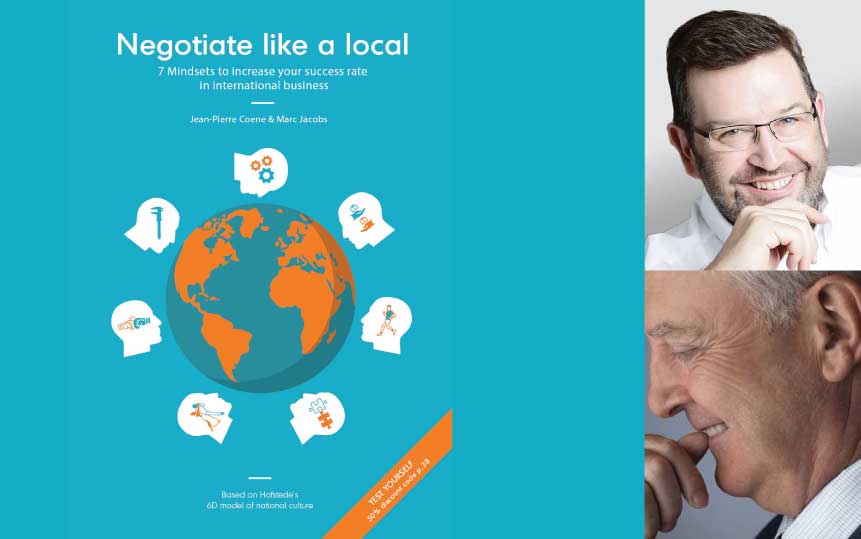- Solutions
-
Solutions
Transform your business with the power of culture.
-
-
Solutions for Individuals
Whether you work in a management team of a multicultural company or work as a consultant in the cultural field, we have solutions tailored to your business needs.
-
Solutions for Organisations
By utilising our research-based and practical approach we ensure that the results of the interventions are immediately applicable and with lasting effects.
-
-
- Resources
- Insights
- Network
- About us
Negotiate Like a Local
7 Mindsets to increase your success rate in International Business by Jean-Pierre Coene and Marc Jacobs

Have you ever had the feeling that your deal is going wrong, even though you can’t think of any reason as to why? Do you have all the qualifications, yet they don’t seem to help you with people from countries other than your own? Most likely, you haven’t factored the crucial impact of culture into the equation.
Operationalizing Hofstede’s 6-D model of National Culture, ‘Negotiate like a local: 7 Mindsets to increase your success rate in international business’, written by The Culture Factor Group (previously known as Hofstede Insights) Accredited Practitioners Jean-Pierre Coene and Marc Jacobs, is indispensable for anyone who finds themselves in an international setting. Building on Huib Wursten’s Culture Clusters™ in the context of international business, the authors have created something which surpasses a simple “how-to” guide comprising of do’s and don’ts.
Their personal anecdotes provide insight into the breadth of experience that both Jean-Pierre and Marc have in this field and humanize the struggles of international negotiation. Unique in its “interactive” style, which differentiates it from purely academic literature, you can dip in and out, read the whole thing at once, or use it as a reference book as and when you need; it is a must-have for your desk.
The idea of writing this book originated as Marc translating Jean-Pierre’s book ‘Négociation internationale – L’entretien de vente en B to B’ into Dutch. His book was written from a French cultural perspective, to help the French with international negotiation, and by translating it, it would become accessible to the Flemish population of Belgium, who have a similar negotiation style.
However, to expand the target audience, they decided to change their approach and write a book in English which would be accessible to and usable by anyone, from anywhere in the world. It even offers advice on how to read it based on whether you prefer to jump straight into the “how” or, like them, learn about the “why” first.
Whether it is your first time negotiating internationally, or your hundredth, this book provides invaluable insight into the negotiation styles of over 100 countries, making them practical by grouping these countries into seven different clusters: The Competitors, The Organisers, The Connected, The Diplomats, The Reciprocators, The Marathonians, and The Craftsmen. These represent the most common mindset found in each country and are presented in an easily understandable context.
There are two ways of identifying which cluster you are working with. The first, is to find your country of interest in the index, which then also states the cluster to which that country belongs. You can then read the corresponding chapter. If, however, you cannot find your country of interest in the index, there being no data for it in the 6-D model, Jean-Pierre and Marc provide helpful ways to recognise each of the clusters through observation.
Some questions to ask yourself about the interactions include:
- Are they willing to work with you to solve a problem?
- Is the relationship more important than the deal?
- Why are they interested in your service?
Frequently used vocabulary of each of the seven clusters also provides an insight into how they see you. You can learn to recognize language including words such as challenge, consensus, rules, structure and trust to help you identify the relevant clusters.
As an example, the UK, the USA and Australia are all part of the Competitor cluster. People from these countries tend to exhibit a strong sense of competition and a desire to win at any cost in their negotiation style. This style can be recognised via the use of vocabulary such as achievement, winning, target and challenge. Asking question like why they are interested in our product, and what do they hope to achieve from this negotiation, can also help you to identify this cluster as these will bring out their competitive tendencies.
Testimonials
★★★★★
“Negotiate Like a Local” by Jean-Pierre Coene and Marc Jacobs has been an invaluable resource in our executive level degree programmes at London Business School. The book’s research has been applied across multiple classes, helping senior leaders appreciate that cultural norms profoundly shape negotiation styles and decision-making. Students consistently remark on how the insights challenge their assumptions and broaden their perspective, enabling them to approach cross-cultural interactions with greater empathy and effectiveness. This practical framework equips executives to navigate global business with confidence, fostering mutual understanding and better outcomes. A must-read for anyone leading in today’s interconnected world.”
Paul Drew, Head of Leadership Programmes, Career Centre, London Business School.
★★★★★
“The best book I have ever read on the cultural aspects of negotiation and even the best book I have read on cultural aspects of doing business around the world full stop. A very practical read with a lot of personal experiences that explains logically and demystifies what we are up against out in the negotiation field. The book is also a useful 360° tool that makes you more conscious of how much an alien you must be to your counterparty as they are to you.”
